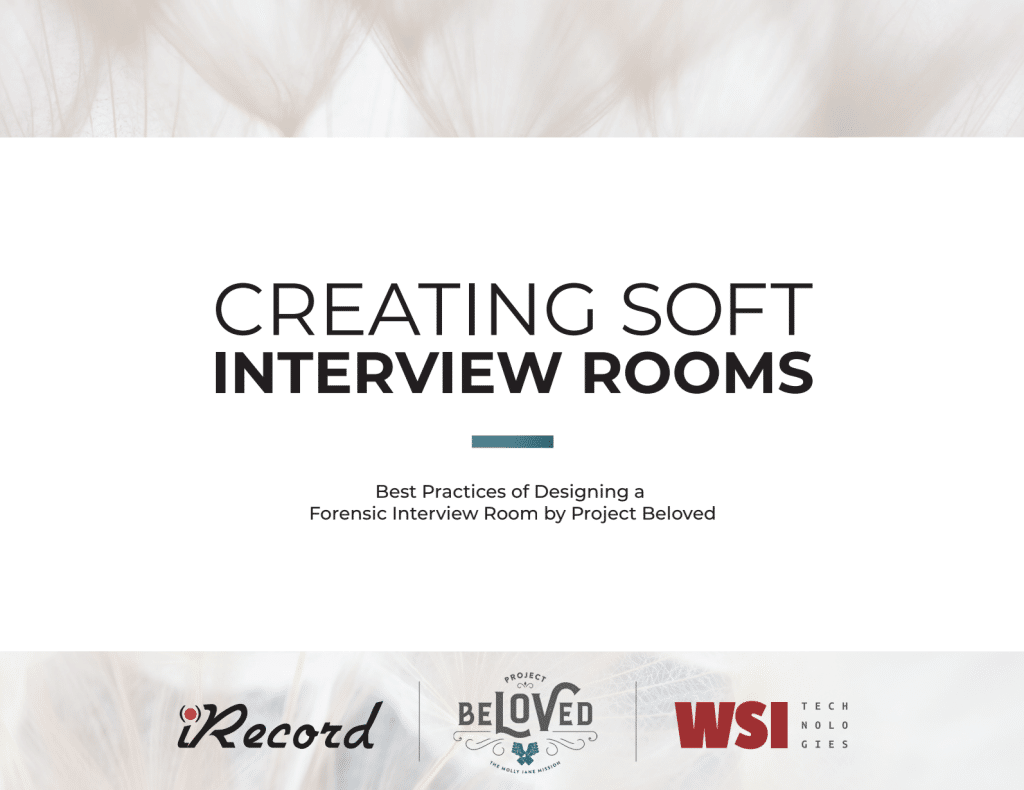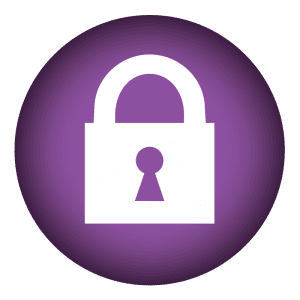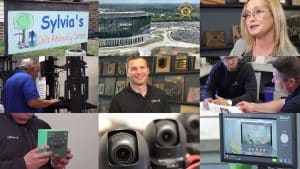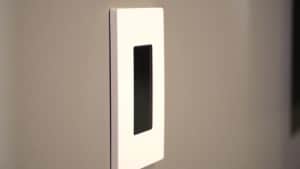Child Advocacy
Start your chain of evidence with the touch of a button.
Protect the Evidence and the Child with a high-quality child forensic interview recording equipment
Child Forensic Interview Recording was found to enhance the ability of prosecutors to file appropriate charges. The ability to demonstrate the demeanor and facial expression of the child was helpful in obtaining timely prosecutions.
Forensic Child Interview Recording
Child Advocacy Centers pioneer best practices for child abuse interviews. Their non-leading questioning techniques and careful documentation shield child victims from the need to confront their abusers. They also reduce the number of interviews children are subjected to, and increase convictions in cases that go to trial. Digital video is a natural partner for CACs.
There are many reasons why videoing a child interview might be a good idea. One is the simple fact that you’ll reduce the number of times the child has to relive the event. Child witnesses also have a high level of recantation, and video provides incontrovertible evidence that a child did make an accusation. In fact, Child Forensic Interview Recording testimony can be used to help refresh a child’s memory in the event that they do have to testify in court.
What was the body language of the person being interviewed? Was the attitude or the demeanor of the suspect inconsistent? High-quality visual recording allows you to capture more in the interview while allowing you to retrieve and share quickly across teams to keep your evidence secure.
iRecord Advantage
One Touch Interview Recording
Eliminate costly and time consuming video training with iRecords one touch recording. If you can operate a light switch you can record an interview with iRecord. (Click Here For 10 Second Training Video)
Evidence Vault Video Capture
The iRecord Evidence Vault is one of the very first interview management tracking applications for police and law enforcement agencies. Our software is ideal for agencies that track interviews from the point of recording by detective until it is ordered to be destroyed. iRecord’s scalable system networks multiple interview rooms to one recorder, then routes all the resulting footage to a central server. Metadata makes it easy to find individual interviews, which can be viewed from any networked computer. The secure Evidence Vault makes it easy to control access, and allows for back up to the Microsoft CJIS cloud for compliance and security.
From The Child’s View
From a child victim’s standpoint, a high quality interview may help resolve a case without the child ever having to physically come to court, which might force the child to confront his or her abuser. In addition, a Child Forensic Interview Recording adds to the credibility of the case and documents exactly how the child disclosed, as well as the types of interview questions that were used.
Video Of Child Abuse Interviews Increases Confessions
There are understandable concerns that allowing the accused to watch the child abuse interview re-victimizes the child. For this reason, most prosecutors who use Child Forensic Interview Recordings set limits that fall short of releasing the video to the defense attorneys. Generally, the video is watched in judge’s chambers by the judge, the defense attorney, and possibly the defendant. Being confronted with video testimony tends to elicit a higher number of confessions, and this seems to hold true in child abuse cases, as well.
Using A Video System Protects Children
While the Supreme Court has made statements in support of videoing child interviews, they’ve thus far stopped short of mandating it. This means, of course, that responsibility for deciding whether recordings are required falls to the states. If your state doesn’t have any laws mandating recorded interviews, you’re in the clear, right?
Wrong.
In a recent court case in Macomb County, Michigan, a defense attorney challenged the prosecutor’s office for failing to video the testimony of the victim. The attorney argued that there might have been exculpatory value to such a recording, and that their defense had been deprived access.
Anyone considering video for their CAC should take note of this story. In Maycomb County, the prosecutor didn’t choose Child Forensic Interview Recording. However, approximately 15 out of Michigan’s 22 Child Advocacy Centers did. This had the effect of setting a precedent, leaving those that didn’t conform labeled as outliers.
The question is not whether your state agencies are moving toward increased use of video, but when. As video becomes a routine tool, you may be asked why you’re not using it yet. Integrating digital recording into your workflow now enables you to set your own policies for how and when video will be used and disseminated…and maybe even set precedents that will be adopted by others. Whether its mandated by law or not, there are many benefits to having a Child Forensic Interview Recording as evidence in a case involving children.
What’s Inside the eBook?
- The Need for Soft Interview Rooms – Why traditional rooms don’t work for trauma survivors
- Key Elements of a Soft Interview Room – The 7 essential features every room should have
- Best Practices for Trauma-Informed Interviews – How investigators can build trust and gather better evidence
- Real-World Case Studies – How agencies are using soft interview rooms to transform investigations
- How to Get Started – Actionable steps for agencies looking to implement a soft interview space
Child Advocacy Case Study
Delaware county child advocacy center
The Delaware County Child Advocacy Center, located in Muncie, IN, is a facility-based community partnership dedicated to pursuing the truth in child abuse investigations. Professionals work as a multidisciplinary team to investigate and intervene in cases of suspected child abuse, primarily sexual abuse. This multidisciplinary team approach brings together all the professionals and agencies needed to offer comprehensive services: law enforcement, child protective services, prosecution, victim advocates, forensic interviewers, mental-health and the medical community. Download the case study to see how Child Forensic Interview Recording equipment became an essential tool in the Delaware County Child Advocacy Center
Keep Up-to-Date with iRecord
Sign up for our monthly newsletter to receive the latest news and products from iRecord.
Child Advocacy Recording Suite
Click below to learn more about each of iRecord’s cutting-edge, digital recording and storage products.
Knowledge Center
Before CACs existed, at-risk and abused children had a very different experience than they do now. Now, they serve over 300,000 children a year. Here are the most important benefits CACs provide.
Carefully Trained Interviewers
Prior to the existence of CACs, the interview process could vary widely from one case to another. Untrained interviewers might engage in improper techniques more likely to elicit false allegations, or they might simply conduct a clumsy interview. In such cases, rapport might not be established, which would make the child less likely to disclose abuse. Alternatively, sloppy questioning might lead to a lack of detail that would result in a failed prosecution. Because CAC interviewers are carefully trained in forensic interviewing techniques, successful prosecutions are more likely. When done well, only one Child Forensic Interview Recording is necessary, which means that children don’t have to relive traumatic events multiple times and it can be shared easily with the court during trial.
A Child-Friendly Environment
For a child, stepping into a clinical setting or an interview room designed for adults can be very intimidating. Naturally, this adversely affects the interview process. In a Child Advocacy Center, the interview room is likely to have a play area and art supplies, so a child can disclose while engaging in a familiar activity. It’s also likely to have child-sized seating, so that the adult interacts on the child’s level, rather than the reverse.
A Buffer from Their Abuser
This may seem unbelievable now, but in the past, child victims were sometimes interviewed in the presence of the alleged abuser. The rise in Child Forensic Interview Recordings further protects the child by preserving more nuanced evidence, and reducing the likelihood that a child will have to testify in court.
More Effective Prosecution
Child Advocacy Centers prevent many problems that plague child abuse cases. Poorly handled investigations increase trauma for the child at all stages of the process. A bad interview can even reduce a child’s credibility in the eyes of judges and prosecutors. Poor evidence also leads to incidents of false allegations. When you consider that a false allegation may result in the child being separated from loving parents or caregivers, the importance of this becomes even more clear. Failed cases are a drain on the resources of law enforcement offices, and fail to protect our most vulnerable citizens. They also become lightning rods for negative media attention.
Resources for Recovery
A final point worth noting is that CACs continue working with families after their role in evidence collection is complete. CACs provide counseling and connect families with a variety of other services, as well. Their work goes beyond the scope of what law enforcement can provide. In this way, they ensure that the victims of abuse and neglect are protected from a case’s beginning to its end, while also preserving high quality forensic evidence to protect the child from his or her abuser in the future. Child Advocacy Centers’ careful Child Forensic Interview Recording, and support improves outcomes for victims, their families, and prosecutors.
When a child is not the victim, but a witness, access can be complicated. Conflicting priorities place people who would normally be on the same side at odds with each other. How can law enforcement agencies navigate this complex situation to get the information they need while also protecting the child? Here are some key factors to consider.
Understand the rights involved. Clearly, police have the right to question a child. They don’t have to speak to a parent first, and they don’t have to have permission. On the other side of the coin, children can refuse to be interviewed. If a child’s parents are not present at the initial moment of contact, they can ask for them, and the police must accommodate them. Of course, once parents are present, they can refuse to allow the child to be interviewed, and there goes your witness out the door. Those are the bare bones of the situation, but we’re a long way from the full story.
Understand the family’s fears. It can be frustrating to be blocked from interviewing a child, and not just because the child might be a critical witness to your case. If a child has witnessed domestic violence, for example, you may have concerns about which parent is currently supervising the child. You may have worries about the child’s recollection being manipulated. These are valid concerns. Conversely, there are many reasons why a parent would be hesitant to have a child testify. If they witnessed a violent crime in their community, parents will worry that they could become a target. Or they might consider it too traumatic for a child to testify against a family member.
Be an ally when possible. To allay parental concerns, you’re going to need to genuinely relate to their fears, and you’ll need to be able to communicate that to them. You’re going to want to make the interview process as painless as possible. And that’s where video comes in.
Videoing interviews meets everyone’s needs. Video interviews are incredibly useful in cases with child witnesses. As we’ve discussed before, you can use mobile devices to conduct interviews early, when the witness’s recollection is still fresh, because you’ll have what you need with you when the moment arises. You can also do the interview where the child is most comfortable. And when you use a service like iRecord, you’ll have high-quality Child Forensic Interview Recording. This makes you less likely to have to re-interview the witness, and may even reduce their likelihood of testifying in court, making it less likely they’ll have to confront the person they’re accusing.
It can be difficult to weigh the rights of a juvenile witness against the needs of your investigation. Video can be a powerful tool to ensure that you mitigate the obstacles and meet the needs of everyone involved, helping you protect and support witnesses while also moving your investigation forward.
A prosecutor’s office in Macomb County, Michigan was recently challenged for not videoing child victim interviews– by the defendant.
How can this be? Well, as it turns out, the defendant’s lawyers honed in on a critical point: Macomb County’s policy of conducting non-recorded interviews was out of step with state protocols. The defense attorneys argued that the prosecution had failed to provide them with evidence they were entitled to– evidence which might be exculpatory. They also stated that the Child Forensic Interview Recording was the foundation of the prosecution’s case, and that if they hadn’t followed proper procedure, then the case was fundamentally flawed.
Fortunately, the judge who heard this argument found there was adequate evidence to proceed, and the defendant was found guilty and received a stiff sentence. But what might have happened had the judge been more receptive to the defense attorneys’ argument? If you don’t have a Child Forensic Interview Recording could you be jeopardizing your case?
There are many reasons why videoing a child interview might be a good idea. One is the simple fact that you’ll reduce the number of times the child has to relive the event. Child witnesses also have a high level of recantation, and video provides incontrovertible evidence that a child did make an accusation. In fact, video testimony can be used to help refresh a child’s memory in the event that they do have to testify in court.
There are cons, too, as with any complex issue. Notably, there are understandable concerns that allowing the accused to watch the video re-victimizes the child. For this reason, most prosecutors who use Child Forensic Interview Recordings set limits that fall short of releasing the video to the defense attorneys. Generally, the video is watched in judge’s chambers by the judge, the defense attorney, and possibly the defendant. As we’ve discussed before, being confronted with video testimony tends to elicit a higher number of confessions, and this seems to hold true in child abuse cases, as well.
While the Supreme Court has made statements in support of videoing child interviews, they’ve thus far stopped short of mandating it. This means, of course, that responsibility for deciding whether recordings are required falls to the states. That brings us back to an important point regarding Michigan, the state where the case we’re discussing was prosecuted. While the Macomb County prosecutor is against videoing child interviews, approximately 15 out of 22 child advocacy centers in Michigan do.This has the effect of setting a precedent, leaving those that don’t conform labeled as outliers. As video becomes a routine tool, new challenges by defendants may indeed find support.
The question is not whether your state agencies are moving toward increased use of video, but when. Integrating digital recording into your workflow now enables you to set your own policies for how and when video will be used and disseminated…and maybe even set precedents that will be adopted by others.










